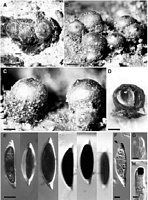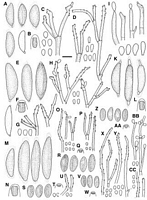|
 Rosellinia nothofagi Rosellinia nothofagi
BiostatusPresent in region - Indigenous. Endemic
Images (click to enlarge)
Caption: Fig. 21 Rosellinia nothofagi. A-C, Stromata, C shows subiculum at left stroma base; D,
Vertical section of stroma, note stroma shell to the right with detached perithecium; E,
| 
Caption: Fig. 12 A-D, Rosellinia novae-zelandiae, PDD 43205: A, Ascospores, last one immature; B,
Ascus apical ring; C, Conidiophores and conidia on the host (PDD 16422); D, Conidiophores
and conidia in culture (PDD 42074); E-H< |
Article: Petrini, L.E. (2003). Rosellinia and related genera in New Zealand. New Zealand Journal of Botany 41(1): 71-138 (http://www.rsnz.org/publish/abstracts.php).
Description: Subiculum persistent, reduced in mature material, dark reddish brown, felty to wiry, bearing
conidiophores in young material. Stromata (1050)1330 ± 200(1750) µm high, (1175)1440 ±
194(1775) µm wide (n = 15), cupulate to globose, dark brown, black around the ostioles,
solitary to crowded. Ostioles coarsely papillate. Ectostroma to 125 µm thick, black, hard.
Entostroma light brown, confined to the base. Perithecia detached and collapsed in mature
material. Ascus apical rings (7.6)8.2 ± 0.5(9) µm high, upper width 5-6 µm, lower width 4-6
µm (n = 15), J+, dark blue. Ascospores (25)29 ± 2.4(37.5) µm long, (6)8.3 ± 0.7(9.6) µm
wide (n = 90), inequilaterally ellipsoidal, dark brown, with straight germ slit, extending
almost over the whole spore length, ending shortly before the extremities, each extremity with
one 3-4 µm long, 3 µm wide, conical, cellular appendage, one of them being more pointed and
the other more rounded and shorter, the whole spore completely surrounded by a thin slimy
sheath.
Conidiogenous cells 4-5 µm wide, light brown. Conidia 10-13 x 5-5.5.
ANAMORPH: Geniculosporium.
Habitat: HOST: Nothofagus.
MATRIX: Corticated twigs 3-4 cm diam.
Notes: ETYMOLOGY: According to the host plant.
NOTES: Rosellinia nothofagi is easily recognised by its ascospores which bear two cellular,
conical appendages surrounded by a slimy sheath, massive stromata, and large conidia.
Rosellinia subsimilis P.Karst. has similar, but, on the average, smaller ascospores, and its
stromata are about half the size and more delicate (Petrini 1993). Rosellinia thelena (Fr. : Fr.)
Rabenh. has also ascospores with smaller, very pronounced appendages. In addition,
anamorph and stromata characters are also different (Petrini 1993).
|